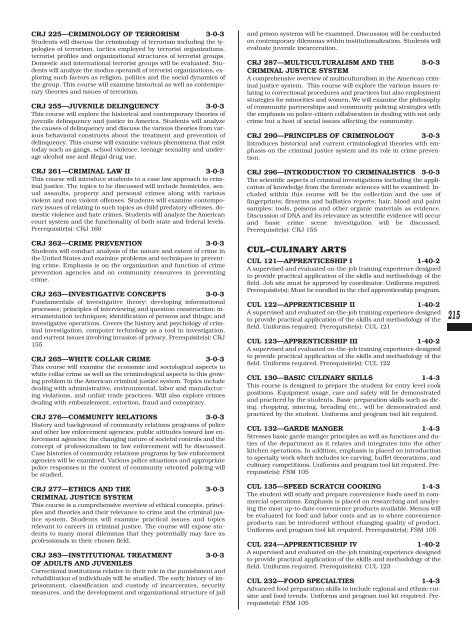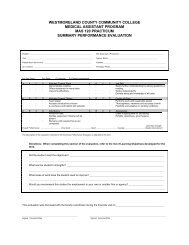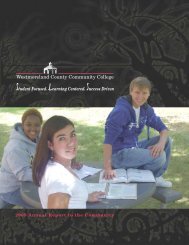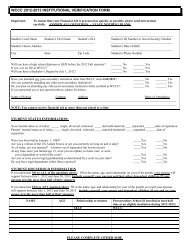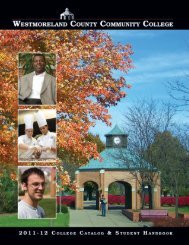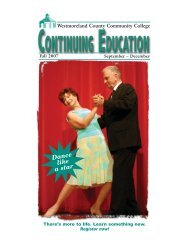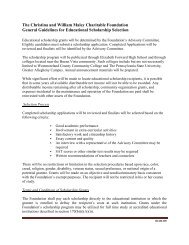CRJ 225—CRIMINOLOGY OF TERRORISM 3-0-3Students will discuss the criminology of terrorism including the typologiesof terrorism, tactics employed by terrorist organizations,terrorist profiles and organizational structures of terrorist groups.Domestic and international terrorist groups will be evaluated. Studentswill analyze the modus operandi of terrorist organizations, exploringsuch factors as religion, politics and the social dynamics ofthe group. This course will examine historical as well as contemporarytheories and issues of terrorism.CRJ 255—JUVENILE DELINQUENCY 3-0-3This course will explore the historical and contemporary theories ofjuvenile delinquency and justice in America. Students will analyzethe causes of delinquency and discuss the various theories from variousbehavioral constructs about the treatment and prevention ofdelinquency. This course will examine various phenomena that existtoday such as gangs, school violence, teenage sexuality and underagealcohol use and illegal drug use.CRJ 261—CRIMINAL LAW II 3-0-3This course will introduce students to a case law approach to criminaljustice. The topics to be discussed will include homicides, sexualassaults, property and personal crimes along with variousviolent and non violent offenses. Students will examine contemporaryissues of relating to such topics as child predatory offenses, domesticviolence and hate crimes. Students will analyze the Americancourt system and the functionality of both state and federal levels.Prerequisite(s): CRJ 160CRJ 262—CRIME PREVENTION 3-0-3Students will conduct analysis of the nature and extent of crime inthe United States and examine problems and techniques in preventingcrime. Emphasis is on the organization and function of crimeprevention agencies and on community resources in preventingcrime.CRJ 263—INVESTIGATIVE CONCEPTS 3-0-3Fundamentals of investigative theory; developing informationalprocesses; principles of interviewing and question construction; instrumentationtechniques; identification of persons and things; andinvestigative operations. Covers the history and psychology of criminalinvestigation, computer technology as a tool in investigation,and current issues involving invasion of privacy. Prerequisite(s): CRJ155CRJ 265—WHITE COLLAR CRIME 3-0-3This course will examine the economic and sociological aspects towhite collar crime as well as the criminological aspects to this growingproblem in the American criminal justice system. Topics includedealing with administrative, environmental, labor and manufacturingviolations, and unfair trade practices. Will also explore crimesdealing with embezzlement, extortion, fraud and conspiracy.CRJ 276—COMMUNITY RELATIONS 3-0-3History and background of community relations programs of policeand other law enforcement agencies; public attitudes toward law enforcementagencies; the changing nature of societal controls and theconcept of professionalism in law enforcement will be discussed.Case histories of community relations programs by law enforcementagencies will be examined. Various police situations and appropriatepolice responses in the context of community oriented policing willbe studied.CRJ 277—ETHICS AND THE 3-0-3CRIMINAL JUSTICE SYSTEMThis course is a comprehensive overview of ethical concepts, principlesand theories and their relevance to crime and the criminal justicesystem. Students will examine practical issues and topicsrelevant to careers in criminal justice. The course will expose studentsto many moral dilemmas that they potentially may face asprofessionals in their chosen field.CRJ 283—INSTITUTIONAL TREATMENT 3-0-3OF ADULTS AND JUVENILESCorrectional institutions relative to their role in the punishment andrehabilitation of individuals will be studied. The early history of imprisonment,classification and custody of incarcerates, securitymeasures, and the development and organizational structure of jailand prison systems will be examined. Discussion will be conductedon contemporary dilemmas within institutionalization. Students willevaluate juvenile incarceration.CRJ 287—MULTICULTURALISM AND THE 3-0-3CRIMINAL JUSTICE SYSTEMA comprehensive overview of multiculturalism in the American criminaljustice system. This course will explore the various issues relatingto correctional procedures and practices but also employmentstrategies for minorities and women. We will examine the philosophyof community partnerships and community policing strategies withthe emphasis on police-citizen collaboration in dealing with not onlycrime but a host of social issues affecting the community.CRJ 290—PRINCIPLES OF CRIMINOLOGY 3-0-3Introduces historical and current criminological theories with emphasison the criminal justice system and its role in crime prevention.CRJ 296—INTRODUCTION TO CRIMINALISTICS 3-0-3The scientific aspects of criminal investigations including the applicationof knowledge from the forensic sciences will be examined. Includedwithin this course will be the collection and the use offingerprints; firearms and ballistics reports; hair, blood and paintsamples; tools, poisons and other organic materials as evidence.Discussion of DNA and its relevance as scientific evidence will occurand basic crime scene investigation will be discussed.Prerequisite(s): CRJ 155CUL–CULINARY ARTSCUL 121—APPRENTICESHIP I 1-40-2A supervised and evaluated on-the-job training experience designedto provide practical application of the skills and methodology of thefield. Job site must be approved by coordinator. Uniforms required.Prerequisite(s): Must be enrolled in the chef apprenticeship program.CUL 122—APPRENTICESHIP II 1-40-2A supervised and evaluated on-the-job training experience designedto provide practical application of the skills and methodology of thefield. Uniforms required. Prerequisite(s): CUL 121CUL 123—APPRENTICESHIP III 1-40-2A supervised and evaluated on-the-job training experience designedto provide practical application of the skills and methodology of thefield. Uniforms required. Prerequisite(s): CUL 122CUL 130—BASIC CULINARY SKILLS 1-4-3This course is designed to prepare the student for entry level cookpositions. Equipment usage, care and safety will be demonstratedand practiced by the students. Basic preparation skills such as dicing,chopping, mincing, breading etc., will be demonstrated andpracticed by the student. Uniforms and program tool kit required.CUL 132—GARDE MANGER 1-4-3Stresses basic garde manger principles as well as functions and dutiesof the department as it relates and integrates into the otherkitchen operations. In addition, emphasis is placed on introductionto specialty work which includes ice carving, buffet decorations, andculinary competitions. Uniforms and program tool kit required. Prerequisite(s):FSM 105CUL 135—SPEED SCRATCH COOKING 1-4-3The student will study and prepare convenience foods used in commercialoperations. Emphasis is placed on researching and analyzingthe most up-to-date convenience products available. Menus willbe evaluated for food and labor costs and as to where convenienceproducts can be introduced without changing quality of product.Uniforms and program tool kit required. Prerequisite(s): FSM 105CUL 224—APPRENTICESHIP IV 1-40-2A supervised and evaluated on-the-job training experience designedto provide practical application of the skills and methodology of thefield. Uniforms required. Prerequisite(s): CUL 123CUL 232—FOOD SPECIALTIES 1-4-3Advanced food preparation skills to include regional and ethnic cuisineand food trends. Uniforms and program tool kit required. Prerequisite(s):FSM 105215
216DAE–EXPANDED FUNCTIONS DENTALASSISTINGDAE 100—DENTAL ANATOMY 2-0-2This course is designed to provide students with a comprehensivestudy of the morphology and function of the human permanent andprimary dentitions and skeletal and dental classifications of occlusion.(Graduates of the WCCC Dental Assisting or Dental Hygieneprograms are not required to take this course. DAS 101 or DAH 104will be substituted for DAE 100)DAE 101—EXPANDED FUNCTIONS 3-6-6DENTAL ASSISTING IThis course is designed to provide students with the knowledge andskills necessary to perform the EFDA functions as delegated by thePA State Board of Dentistry. Lecture and laboratory sessions willpresent each function in detail and provide students with the opportunityto become competent in the EFDA functions.DAE 102—EXPANDED FUNCTIONS 1-8-3DENTAL ASSISTING IIThis course is designed to provide students with the opportunity toperform EFDA functions and evaluate their performance throughjournal writing and class discussion. Clinical experience is arrangedthrough approved dental practices. Liability insurance must bemaintained by the student while enrolled in the program. Clinicalsessions include a wide variety of restorative experiences on manypatients. Two four-hour clinical sessions are required per week for15 weeks. Students who are able to schedule more than eight hoursper week may complete the clinical rotation in less than 15 weeks.Prerequisites(s): DAE 100, DAE 101DAH–DENTAL HYGIENEDAH 101—INTRODUCTION TO DENTISTRY 2-2-3Designed to give the student an in-depth study of dental terminology,medical/dental histories, charting, dental instruments, infectioncontrol, sterilization, pain control and patient management.Lecture and laboratory sessions introduce the student to each of thedental specialties and provide the student with the knowledge andskills required for application in the clinical setting. Prerequisite(s):BIO 171, CHM 264, SOC 160; Corequisite(s): DAH 102, DAH 104,BIO 172DAH 102—DENTAL MATERIALS 1-2-2Lecture and laboratory course designed to familiarize the dental hygienestudent with commonly used materials in dentistry. The focusis on properties, proper technique of manipulation, and influence ofmanipulation upon these properties. Prerequisite(s): BIO 171, CHM264, SOC 160; Corequisite(s): BIO 172, DAH 101, DAH 104DAH 103—MEDICAL EMERGENCIES 1-0-1Prepares student to recognize and manage medical emergencies ina dental office. Emphasis is placed on prevention through the useof medical histories and the team approach to emergency situations.Corequisite(s): DAH 105, DAH 111, DAH 112, DAH 113, DAH 114DAH 104—HEAD, NECK AND DENTAL ANATOMY 4-0-4Designed to reinforce the normal anatomical structures, musculature,blood and nerve supply to the head and neck. The administrationof local anesthesia, tooth morphology and function are alsodiscussed. Prerequisite(s): BIO 171, CHM 264, SOC 160; Corequisite(s):DAH 101, DAH 102, BIO 172DAH 105—DENTAL RADIOLOGY 2-2-3Provides an overview of dental radiology principles and techniques.Topics include X-ray production, radiation safety, exposure technique,film processing, landmark identification and client management.The student will apply didactic concepts in a supervisedclinical laboratory setting. Prerequisite(s): DAH 104; Corequisite(s):DAH 103, DAH 111, DAH 112, DAH 113, DAH 114DAH 106—NUTRITIONAL BIOCHEMISTRY 2-0-2Introduces the science of nutrition. Sources and functions of nutrients,utilization of food in the body, nutritional requirements for variousage groups and rudiments of diet counseling are discussed.Prequisite(s): DAH 103, DAH 105, DAH 111, DAH 112, DAH 113,DAH 114; Corequisite(s): DAH 109, DAH 115, DAH 117DAH 109—ORAL PATHOLOGY 2-0-2Studies the process of diseases with emphasis on diseases and theirmanifestations in the oral cavity. Recognition and detection of suchdeviations from normal is stressed. The emphasis is on inflammation,regeneration, repair, immunity, allergy, oral manifestations ofdisease, tumors and developmental disturbances. Prequisite(s): DAH103, DAH 105, DAH 111, DAH 112, DAH 113, DAH 114; Corequisite(s):DAH 106, DAH 115, DAH 117DAH 111—DENTAL HYGIENE LECTURE 3-0-3Provides an introduction to the fundamental concepts of oral healthcare services, disease control and dental hygiene instrumentationskills. Corequisite(s): DAH 103, DAH 105, DAH 112, DAH 113, DAH114DAH 112—DENTAL HYGIENE LAB 0-8-4Designed for students to observe, discuss and practice the clinicalskills required to perform oral health care services. Students willapply didactic concepts in a supervised clinical laboratory setting.Prerequisite(s): BIO 172; Corequisite(s): DAH 103, DAH 105, DAH111, DAH 113, DAH 114DAH 113—ORAL HISTOLOGY/EMBRYOLOGY 2-0-2Studies the embryonic development of the head, face and oral cavity.Histologic structure of the oral tissues with relation to their clinicalform and function is discussed. Corequisite(s): BIO 172, DAH 103,DAH 105, DAH 111, DAH 114DAH 114—PERIODONTICS I 3-0-3Designed to study the periodontium in healthy and diseased states.Emphasis is placed on the anatomy of the periodontium, diseaseclassification and etiology, the assessment and documentation ofclinical findings and the role of the dental hygienist in non-surgicalperiodontal therapy.DAH 115—CLINICAL DENTAL HYGIENE I 2-12-5Provides for development of the knowledge and clinical skills requiredto provide oral health care services. Didactic emphasis isplaced on disease control and prevention. Students will provide oralhealth care services in a supervised clinical setting. Prequisite(s):DAH 103, DAH 105, DAH 111, DAH 112, DAH 113, DAH 114;Corequisite(s): DAH 106, DAH 109, DAH 117DAH 117—LOCAL ANESTHESIA 1.5-3-3This course is designed to provide the didactic and clinical knowledgeof safe and effective pain control through the administration oftopical and local anesthetic agents. Prequisite(s): DAH 103, DAH105, DAH 111, DAH 112, DAH 113, DAH 114; Corequisite(s): DAH106, DAH 109, DAH 115DAH 205—PERIODONTICS II 1-0-1Designed to study the diagnosis and treatment of periodontal disease.Emphasis is placed on the differentiation of various periodontalsurgical procedures, wound healing, implantology, pre- andpost-operative patient education and preventive maintenance. Prerequisite(s):DAH 106, DAH 109, DAH 114, DAH 115, DAH 117DAH 206—CLINICAL DENTAL HYGIENE II 2-16-6Provides refinement of the knowledge and skills required to provideoral health care services. Didactic emphasis is placed on the provisionof services for and the management of patients with specialneeds. Students will provide oral health care services in a supervisedclinical setting. Prerequisite(s): DAH 106, DAH 109, DAH 114, DAH115, DAH 117DAH 207—PHARMACOLOGY 2-0-2Designed for dental hygiene students to study the physiology, interactionsand effects of drugs. Emphasis is placed on drugs commonlyused and/or encountered in dental practice. Prerequisite(s) DAH115; Corequisite(s): DAH 206, BIO 265
- Page 4 and 5:
WESTMORELAND COUNTY COMMUNITY COLLE
- Page 6 and 7:
WCCC PROFILE5Founded: 1970Location:
- Page 8 and 9:
WCCC EDUCATION CENTERS7Fayette Coun
- Page 10 and 11:
ADMISSIONS9• The POS Perkins Stat
- Page 12 and 13:
ADMISSIONS11degree or diploma are n
- Page 14 and 15:
EXPENSES AND FINANCIAL AID13Tuition
- Page 16 and 17:
EXPENSES AND FINANCIAL AID15FINANCI
- Page 18 and 19:
SCHOLARSHIPS17GENERAL SCHOLARSHIPS
- Page 20 and 21:
SCHOLARSHIPS19SPECIAL CRITERIA SCHO
- Page 22 and 23:
SCHOLARSHIPS21PROGRAM SPECIFIC SCHO
- Page 24 and 25:
SCHOLARSHIPS23PROGRAM SPECIFIC SCHO
- Page 26 and 27:
ACADEMIC INFORMATION25Unit of Credi
- Page 28 and 29:
ACADEMIC INFORMATION27College Learn
- Page 30 and 31:
ACADEMIC INFORMATION29Critical Thin
- Page 32 and 33:
PROGRAMS OF STUDYACCOUNTINGAccounti
- Page 34 and 35:
ACADEMIC PROGRAMSWCCC offers the as
- Page 36 and 37:
ASSOCIATE OF ARTS DEGREE (AA)Electi
- Page 38 and 39:
Teacher Education, AA(SECONDARY OR
- Page 40 and 41:
GUIDE TO SELECTING COURSES FOR TRAN
- Page 42 and 43:
GUIDE TO SELECTING COURSES FOR TRAN
- Page 44 and 45:
GUIDE TO SELECTING COURSES FOR TRAN
- Page 46 and 47:
Associate of Fine Arts, AFAART THER
- Page 48 and 49:
Associate of Fine Arts Degree, AFAV
- Page 50 and 51:
Accounting, AASDivision of Computer
- Page 52 and 53:
Architectural Drafting and Design,
- Page 54 and 55:
Baking and Pastry, AASAPPRENTICESHI
- Page 56 and 57:
Baking and Pastry, AASNON-APPRENTIC
- Page 58 and 59:
Baking and Pastry, CertificateNON-A
- Page 60 and 61:
BusinessThe growth of the Internet
- Page 62 and 63:
Business, AASGENERAL MANAGEMENT OPT
- Page 64 and 65:
Business, AASMARKETING MANAGEMENT O
- Page 66 and 67:
Business, AASSMALL BUSINESS MANAGEM
- Page 68 and 69:
Business, DiplomaDivision of Comput
- Page 70 and 71:
Business, CertificateHUMAN RESOURCE
- Page 72 and 73:
Business, CertificateSUPPLY CHAIN M
- Page 74 and 75:
Clinical Laboratory Technology, AAS
- Page 76 and 77:
Clinical Laboratory Technology, AAS
- Page 78 and 79:
Computer Information Security, Cert
- Page 80 and 81:
Computer Numerical Control Technolo
- Page 82 and 83:
Computer Systems Electronics Techno
- Page 84 and 85:
Computer Technology, AASNETWORKING
- Page 86 and 87:
Computer Technology, AASTECHNICAL S
- Page 88 and 89:
Computer Technology, DiplomaCOMPUTE
- Page 90 and 91:
Computer Technology, CertificateDAT
- Page 92 and 93:
Computer Technology, CertificateNET
- Page 94 and 95:
Criminal Justice, AASDivision of Pu
- Page 96 and 97:
Criminal Justice, CertificateCORREC
- Page 98 and 99:
Culinary Arts, AASAPPRENTICESHIP OP
- Page 100 and 101:
Culinary Arts, DiplomaAPPRENTICESHI
- Page 102 and 103:
Culinary Arts, AASNON-APPRENTICESHI
- Page 104 and 105:
Dental Assisting, DiplomaDivision o
- Page 106 and 107:
Dental Assisting, Diploma(CONTINUED
- Page 108 and 109:
Dental Hygiene, AAS(CONTINUED)Divis
- Page 110 and 111:
Diagnostic Medical Sonography, AAS(
- Page 112 and 113:
Diagnostic Medical Sonography, AAS(
- Page 114 and 115:
Dietetic Technology/Nutritional Ser
- Page 116 and 117:
Drafting and Design Technology, AAS
- Page 118 and 119:
Education/Pre-K -Grade 4, AASDivisi
- Page 120 and 121:
Education/Pre-K-Grade 4, Certificat
- Page 122 and 123:
Electrical Utility Technology, AAS(
- Page 124 and 125:
Engineering Technology, AASWorkforc
- Page 126 and 127:
Expanded Functions Dental Assisting
- Page 128 and 129:
Fire Science Technology, DiplomaWor
- Page 130 and 131:
Forensic Science, CertificateFORENS
- Page 132 and 133:
Graphic CommunicationsGRAPHICS & PU
- Page 134 and 135:
Graphic Communications, Certificate
- Page 136 and 137:
Heating, Ventilation, Air-Condition
- Page 138 and 139:
Homeland Security, AASWorkforce Dev
- Page 140 and 141:
Horticulture, AASFLORICULTURE OPTIO
- Page 142 and 143:
Horticulture, AASTURFGRASS MANAGEME
- Page 144 and 145:
Horticulture, CertificateLANDSCAPE
- Page 146 and 147:
Hotel/Motel Management, Certificate
- Page 148 and 149:
Industrial Electricity Technology,
- Page 150 and 151:
Machine Technology, AASWorkforce De
- Page 152 and 153:
Magnetic Resonance Imaging, Certifi
- Page 154 and 155:
Magnetic Resonance Imaging, Certifi
- Page 156 and 157:
Manufacturing Technology, AASMANUFA
- Page 158 and 159:
Medical Assisting, DiplomaDivision
- Page 160 and 161:
Multimedia and Photography, AASMULT
- Page 162 and 163:
Multimedia and Photography, Certifi
- Page 164 and 165:
Natural Gas and Oil Technology, Cer
- Page 166 and 167: Nursing, AAS(CONTINUED)Division of
- Page 168 and 169: Nursing, Advanced Standing to AAS f
- Page 170 and 171: Nursing, Advanced Standing to AAS f
- Page 172 and 173: Nursing, Practical Diploma(CONTINUE
- Page 174 and 175: Office Technology, AASMEDICAL ADMIN
- Page 176 and 177: Office Technology, DiplomaMEDICAL A
- Page 178 and 179: Office Technology, CertificateCUSTO
- Page 180 and 181: Paralegal, AASDivision of Public Se
- Page 182 and 183: Phlebotomy/Specimen Processing, Cer
- Page 184 and 185: Radiology Technology, AASDivision o
- Page 186 and 187: Radiology Technology, AAS(CONTINUED
- Page 188 and 189: Restaurant/Culinary Management, AAS
- Page 190 and 191: Restaurant/Culinary Management, Cer
- Page 192 and 193: Science Technology, AASBIOLOGY OPTI
- Page 194 and 195: Science Technology, AASFORENSICS LA
- Page 196 and 197: Travel, Tourism and Lodging Managem
- Page 198 and 199: Web Technology, AASWEB COMMERCE OPT
- Page 200 and 201: Web Technology, CertificateWEB PUBL
- Page 202 and 203: Welding Engineering Technology, Cer
- Page 204 and 205: COURSE DESCRIPTIONSIndex of Courses
- Page 206 and 207: ART 142—TYPOGRAPHY 1-4-3Introduct
- Page 208 and 209: BIO 171—ANATOMY AND PHYSIOLOGY I
- Page 210 and 211: BUS 261—INTERNATIONAL BUSINESS 3-
- Page 212 and 213: CIS 262—DIGITAL FORENSICS II 3-0-
- Page 214 and 215: CPT 195—EXCEL FOR WINDOWS 3-0-3Th
- Page 218 and 219: DAH 208—CLINICAL DENTAL HYGIENE I
- Page 220 and 221: DMS 214—ACCOUSTICAL PRINCIPLES/ 3
- Page 222 and 223: EGR 210—QUALITY CONTROL 3-0-3Cove
- Page 224 and 225: ENG 168—POLICE REPORT WRITING 3-0
- Page 226 and 227: FRN 256—INTERMEDIATE FRENCH II 3-
- Page 228 and 229: FST 220—FIREFIGHTING TACTICS 3-0-
- Page 230 and 231: HIS-HISTORYHIS 155—EARLY WESTERN
- Page 232 and 233: HOR 212—PRUNING 2-2-3Deals with t
- Page 234 and 235: LAS 200—AMERICAN CONSTITUTIONAL 3
- Page 236 and 237: MKT 242—RETAILING 3-0-3Principles
- Page 238 and 239: MTH 108—MATHEMATICS FOR 3-2-4THE
- Page 240 and 241: MUS 178—COLLEGE ORCHESTRA II 2-0-
- Page 242 and 243: NSG 131—BASIC NURSING CARE OF 1.5
- Page 244 and 245: OFT 220—TRANSCRIPTION AND FILING
- Page 246 and 247: POL 200—CONSTITUTIONAL POWERS AND
- Page 248 and 249: RBT 210—ROBOTIC TEAMING 3-2-4Robo
- Page 250 and 251: WEB 110—WEB DESIGN 3-0-3An explor
- Page 252 and 253: 251
- Page 254 and 255: STUDENT SERVICES AND RESOURCESTDD &
- Page 256 and 257: STUDENT SERVICES AND RESOURCESWirel
- Page 258 and 259: STUDENT RIGHTS AND RESPONSIBILITIES
- Page 260 and 261: STUDENT RIGHTS AND RESPONSIBILITIES
- Page 262 and 263: STUDENT RIGHTS AND RESPONSIBILITIES
- Page 264 and 265: STUDENT LIFEIntercollegiate Athleti
- Page 266 and 267:
STUDENT LIFEHorticulture ClubThe Ho
- Page 268 and 269:
PERSONNEL DIRECTORYBOARD OF TRUSTEE
- Page 270 and 271:
PERSONNEL DIRECTORYELIZABETH N. GWY
- Page 272 and 273:
PERSONNEL DIRECTORYPATRICIA E. GUTH
- Page 274 and 275:
PERSONNEL DIRECTORYPROFESSIONAL STA
- Page 276 and 277:
PERSONNEL DIRECTORYWCCC EDUCATION F
- Page 278 and 279:
LOCATIONS AND FACILITIESFounders Ha
- Page 280 and 281:
LOCATIONS AND FACILITIESScience Hal
- Page 282 and 283:
INDEXAAcademic Advising . . . . . .
- Page 284 and 285:
INDEXEvents, Scheduling . . . . . .
- Page 286 and 287:
INDEXStudent Development Center . .
- Page 288 and 289:
MAJORSDRAFTING & DESIGN TECHNOLOGYD


